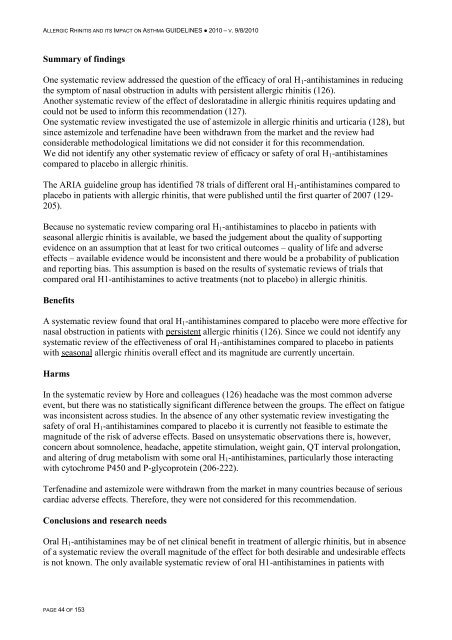Allergic Rhinitis and its Impact on Asthma - ARIA
Allergic Rhinitis and its Impact on Asthma - ARIA
Allergic Rhinitis and its Impact on Asthma - ARIA
Create successful ePaper yourself
Turn your PDF publications into a flip-book with our unique Google optimized e-Paper software.
ALLERGIC RHINITIS AND ITS IMPACT ON ASTHMA GUIDELINES ● 2010 – V. 9/8/2010<br />
Summary of findings<br />
One systematic review addressed the questi<strong>on</strong> of the efficacy of oral H1-antihistamines in reducing<br />
the symptom of nasal obstructi<strong>on</strong> in adults with persistent allergic rhinitis (126).<br />
Another systematic review of the effect of desloratadine in allergic rhinitis requires updating <str<strong>on</strong>g>and</str<strong>on</strong>g><br />
could not be used to inform this recommendati<strong>on</strong> (127).<br />
One systematic review investigated the use of astemizole in allergic rhinitis <str<strong>on</strong>g>and</str<strong>on</strong>g> urticaria (128), but<br />
since astemizole <str<strong>on</strong>g>and</str<strong>on</strong>g> terfenadine have been withdrawn from the market <str<strong>on</strong>g>and</str<strong>on</strong>g> the review had<br />
c<strong>on</strong>siderable methodological limitati<strong>on</strong>s we did not c<strong>on</strong>sider it for this recommendati<strong>on</strong>.<br />
We did not identify any other systematic review of efficacy or safety of oral H1-antihistamines<br />
compared to placebo in allergic rhinitis.<br />
The <strong>ARIA</strong> guideline group has identified 78 trials of different oral H1-antihistamines compared to<br />
placebo in patients with allergic rhinitis, that were published until the first quarter of 2007 (129-<br />
205).<br />
Because no systematic review comparing oral H1-antihistamines to placebo in patients with<br />
seas<strong>on</strong>al allergic rhinitis is available, we based the judgement about the quality of supporting<br />
evidence <strong>on</strong> an assumpti<strong>on</strong> that at least for two critical outcomes – quality of life <str<strong>on</strong>g>and</str<strong>on</strong>g> adverse<br />
effects – available evidence would be inc<strong>on</strong>sistent <str<strong>on</strong>g>and</str<strong>on</strong>g> there would be a probability of publicati<strong>on</strong><br />
<str<strong>on</strong>g>and</str<strong>on</strong>g> reporting bias. This assumpti<strong>on</strong> is based <strong>on</strong> the results of systematic reviews of trials that<br />
compared oral H1-antihistamines to active treatments (not to placebo) in allergic rhinitis.<br />
Benef<str<strong>on</strong>g>its</str<strong>on</strong>g><br />
A systematic review found that oral H1-antihistamines compared to placebo were more effective for<br />
nasal obstructi<strong>on</strong> in patients with persistent allergic rhinitis (126). Since we could not identify any<br />
systematic review of the effectiveness of oral H1-antihistamines compared to placebo in patients<br />
with seas<strong>on</strong>al allergic rhinitis overall effect <str<strong>on</strong>g>and</str<strong>on</strong>g> <str<strong>on</strong>g>its</str<strong>on</strong>g> magnitude are currently uncertain.<br />
Harms<br />
In the systematic review by Hore <str<strong>on</strong>g>and</str<strong>on</strong>g> colleagues (126) headache was the most comm<strong>on</strong> adverse<br />
event, but there was no statistically significant difference between the groups. The effect <strong>on</strong> fatigue<br />
was inc<strong>on</strong>sistent across studies. In the absence of any other systematic review investigating the<br />
safety of oral H1-antihistamines compared to placebo it is currently not feasible to estimate the<br />
magnitude of the risk of adverse effects. Based <strong>on</strong> unsystematic observati<strong>on</strong>s there is, however,<br />
c<strong>on</strong>cern about somnolence, headache, appetite stimulati<strong>on</strong>, weight gain, QT interval prol<strong>on</strong>gati<strong>on</strong>,<br />
<str<strong>on</strong>g>and</str<strong>on</strong>g> altering of drug metabolism with some oral H1-antihistamines, particularly those interacting<br />
with cytochrome P450 <str<strong>on</strong>g>and</str<strong>on</strong>g> P-glycoprotein (206-222).<br />
Terfenadine <str<strong>on</strong>g>and</str<strong>on</strong>g> astemizole were withdrawn from the market in many countries because of serious<br />
cardiac adverse effects. Therefore, they were not c<strong>on</strong>sidered for this recommendati<strong>on</strong>.<br />
C<strong>on</strong>clusi<strong>on</strong>s <str<strong>on</strong>g>and</str<strong>on</strong>g> research needs<br />
Oral H1-antihistamines may be of net clinical benefit in treatment of allergic rhinitis, but in absence<br />
of a systematic review the overall magnitude of the effect for both desirable <str<strong>on</strong>g>and</str<strong>on</strong>g> undesirable effects<br />
is not known. The <strong>on</strong>ly available systematic review of oral H1-antihistamines in patients with<br />
PAGE 44 OF 153


